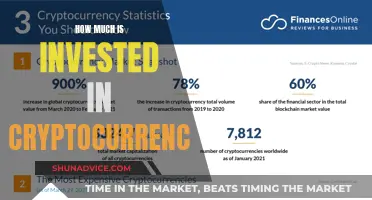
Altcoins are any cryptocurrencies that are not Bitcoin (or Ethereum). There are thousands of altcoins on the market, and they are incredibly risky investments. Altcoins make up nearly 40% of the total cryptocurrency market, according to CoinMarketCap. While it is possible to get rich by investing in altcoins, it is also very possible to lose all your money. Altcoins are generally less liquid than Bitcoin and have a smaller investment market. However, they can be a good investment if you do your research and understand the risks involved.
| Characteristics | Values |
|---|---|
| Definition | All cryptocurrencies other than Bitcoin (and, for some people, Ethereum) |
| Number of Altcoins | Tens of thousands |
| Types | Payment tokens, security tokens, utility tokens, meme coins, governance tokens |
| Pros | Improve upon another cryptocurrency's weaknesses, higher survivability, thousands to choose from |
| Cons | Lower popularity and smaller market cap, less liquid than Bitcoin, difficult to determine use cases, many altcoins are scams |
| Examples | Ether, Litecoin, Binance Coin, Dogecoin, Shiba Inu |
What You'll Learn

Altcoins are riskier investments than Bitcoin
Altcoins are any cryptocurrencies that are not Bitcoin (BTC) or, according to some, Bitcoin and Ethereum (ETH). There are tens of thousands of altcoins on the market, and they make up nearly 40% of the total cryptocurrency market.
While altcoins can be a good investment, they are incredibly risky. The sheer number of altcoins available makes it difficult to determine which might be legitimate, and many are scams or lose developer and community interest.
- Lower popularity and smaller market cap: Altcoins have a smaller investment market compared to Bitcoin, which has generally remained above 40% of the global cryptocurrency market since 2016.
- Thin liquidity: The altcoin market is characterised by fewer investors and less activity, resulting in thin liquidity.
- Difficult to determine use cases: It is not always easy to distinguish between different altcoins and their respective use cases, making investment decisions complicated and confusing.
- Scams and failed projects: Several "dead" altcoins have sunk investor dollars, and many altcoins are scams or have lost developer and community interest.
- Regulation and fraud: Many initial coin offerings (ICOs) are not securities that fall under the U.S. Securities and Exchange Commission's jurisdiction, and even those that do can still pose a significant risk of fraud.
- Volatility: Altcoins are more volatile than Bitcoin, and investments can fall out of favour as quickly as they gain popularity.
Due to these risks, it is crucial to conduct thorough research before investing in altcoins. Understanding the underlying technology, the team behind the project, and the use case for the blockchain and token is essential.
Additionally, investors should only invest money they can afford to lose and consider treating altcoin investments as long-term holdings rather than trying to time the market.
Bitcoin Mining Stocks: Worth the Investment Risk?
You may want to see also

Altcoins are any cryptocurrency that is not Bitcoin
Altcoins are any cryptocurrencies that are not Bitcoin (BTC) and, for some, not Ethereum (ETH). They are alternatives to Bitcoin and often present themselves as better options to the premier cryptocurrency. Altcoins make up nearly 40% of the total cryptocurrency market.
There are tens of thousands of altcoins on the market, and it is difficult to tell which might be legitimate. Altcoins are incredibly risky investments, and you may be more likely to lose than win if you don't do your research.
If you are investing in altcoins for the long haul, you must truly believe in what you choose as a good investment; otherwise, you are just gambling.
According to Ryan George, the chief marketing officer at Docupace, you can't tell if an altcoin is a good investment. The same goes for nearly all securities investments. The key difference with altcoins is the protections in place.
When you invest in a security offered on a regulated exchange like the NYSE and Nasdaq, you have dozens of protections built over 100-plus years of trading. These protections are not available with most initial coin offerings (ICOs).
Questions to Ask Before Investing in Altcoins
- Who is issuing and sponsoring the altcoin? What is their background, and how are they making money on the transaction?
- Where is your money going and what will it be used for?
- How and when can you sell your investment? What will it cost to sell it?
- What specific rights are you entitled to with this investment?
- Are there financial statements available? Are they being audited? If so, by whom?
- What legal protections may be available in the event of fraud, a hack or malware?
- Who is responsible for refunding your money if something goes wrong? Will there be adequate funds to repay you if your rights are violated?
Final Thoughts
Altcoins have proven to be an amazing way to invest your money. Even the best altcoins will continue to see ebbs and flows in value, but the highs are getting higher, and the lows are nowhere near as low as they have been in the past.
A Beginner's Guide to Bitcoin Investing in the Philippines
You may want to see also

Altcoins can be used to gain direct exposure to the demand for digital currency
Altcoins: Direct Exposure to the Demand for Digital Currency
Altcoins are any cryptocurrencies that are not Bitcoin (BTC) or, in some cases, Ethereum (ETH). There are over 5,000 altcoins, making up nearly 40% of the total cryptocurrency market. They can be a risky investment, but they also have a much higher upside in terms of percentage gain.
If you are looking to gain direct exposure to the demand for digital currency, altcoins can be a good investment option. Here's why:
High Upside Potential
Altcoins offer the potential for high percentage gains. While they are riskier than investing in more established cryptocurrencies like Bitcoin or Ethereum, the potential rewards can be much higher. For example, Dogecoin, a popular meme coin, skyrocketed in value in 2021, turning a few hundred bucks into tens of thousands – if not millions – of dollars.
Exposure to Innovative Blockchain Projects
Many altcoins are built on innovative blockchain projects that aim to improve upon the limitations of Bitcoin and Ethereum. For instance, Solana (SOL) is a blockchain platform that can handle many more transactions per second than Ethereum and charges lower transaction fees. Cardano (ADA) is another example of a blockchain platform with a research-based approach, created by engineers, mathematicians, and cryptography experts.
Diversification within the Cryptocurrency Market
Investing in altcoins allows you to diversify your portfolio within the cryptocurrency market. While Bitcoin remains the most dominant cryptocurrency, altcoins like Ethereum, Litecoin, and Binance Coin have also gained widespread popularity and adoption. By investing in altcoins, you can reduce the risk of having all your eggs in one basket and potentially benefit from the growth of multiple blockchain projects.
Lower Entry Point
Altcoins often have lower prices than Bitcoin, making them more accessible to investors who want to gain exposure to the cryptocurrency market without breaking the bank. Additionally, some altcoins, like Litecoin, do not require specialized equipment for mining, making it easier for individuals to get involved in the mining process.
Utility and Use Cases
Many altcoins have strong utility and use cases that make them attractive investment options. For example, Binance Coin (BNB) is a utility cryptocurrency that serves as a payment method for fees on the Binance Exchange, one of the most widely used exchanges globally. Another example is Stellar Lumens (XLM), a blockchain protocol built for payment systems, which aims to provide access to financial products for people without bank accounts.
In conclusion, while altcoins come with higher risks, they can also provide direct exposure to the demand for digital currency and offer the potential for high returns. However, it is crucial to do your research and understand the risks involved before investing in any cryptocurrency, as the market is highly volatile and subject to fraud.
The Ultimate Guide to Investing in Litecoin Cash
You may want to see also

Altcoins are improved versions of the cryptocurrency they are derived from
Altcoins are derived from other cryptocurrencies, most often Bitcoin, but also Ethereum. They are designed and released by developers with different visions and uses for their tokens or cryptocurrency.
The first altcoin was Litecoin, which was forked from the Bitcoin blockchain in 2011. Litecoin uses a different proof-of-work consensus mechanism than Bitcoin, which is less energy-intensive and quicker.
Other altcoins have been created to improve upon the perceived limitations of Bitcoin and Ethereum. For example, some have been endorsed as having newer features than Bitcoin, such as handling more transactions per second or using different consensus algorithms.
Ether is another example of an altcoin that did not fork from Bitcoin. It was designed by Vitalik Buterin, Dr. Gavin Wood, and a few others to be used in Ethereum, the world's largest blockchain-based virtual machine.
Altcoins can also be used within their respective blockchains to accomplish something. For instance, Ether is used in Ethereum to pay transaction fees.
There are tens of thousands of altcoins on the market, and they can be categorised in the following ways:
- Payment tokens: designed to be used as currency to exchange value between parties. Bitcoin is an example of a payment token.
- Stablecoins: aim to reduce volatility by pegging value to another asset. Notable stablecoins include Tether's USDT, MakerDAO's DAI, and the USD Coin (USDC).
- Security tokens: represent fundraising efforts or ownership, or tokenized assets. They are regulated by the Securities and Exchange Commission because they are designed to act as securities.
- Utility tokens: used to provide services within a network, such as purchasing services, paying network fees, or redeeming rewards. Filecoin is an example of a utility token.
- Meme coins: inspired by a joke or a silly take on other well-known cryptocurrencies. Dogecoin is an example of a meme coin.
- Governance tokens: allow holders certain rights within a blockchain, such as voting for changes to protocols.
The Bitcoin Investment Journey: A Billion-Dollar Adventure
You may want to see also

Altcoins are less liquid than Bitcoin
Altcoins are any cryptocurrency that is not Bitcoin (or Ethereum). There are thousands of altcoins on the market, and they are generally less liquid than Bitcoin. This means that they have a smaller investment market, with fewer investors and less trading activity. As a result, altcoins are more susceptible to market fluctuations and loss of value, and it can be challenging to execute large trades without causing price fluctuations.
The altcoin market is dynamic and subject to rapid fluctuations, presenting investors and traders with potentially high-profit opportunities, but also high risk. Altcoins often have a lower market cap than Bitcoin, so they have the potential for rapid value growth. However, this also means that the altcoin market is less liquid and more subject to volatility.
The level of liquidity in a market is determined by the number of participants and the trading volume. Bitcoin, as the most widely adopted cryptocurrency, has the highest level of liquidity. It has the largest number of trading pairs available and is widely accepted as a means of payment and investment. This makes it easier for investors to enter and exit positions.
In contrast, altcoins have a smaller investment market and fewer participants, resulting in thin liquidity. This means that there may not be enough buyers or sellers in the market to facilitate large trades without significantly impacting the price of the altcoin.
The low liquidity of altcoins also makes them more vulnerable to price manipulation. A single large trade can drastically alter the price of an altcoin, whereas a highly liquid market like Bitcoin has many participants, ensuring there is always someone willing to buy or sell, thus keeping prices stable.
The higher liquidity of Bitcoin also provides protection against liquidity risk, which refers to the possibility of the market becoming illiquid rapidly. In a highly liquid market like Bitcoin, it is unlikely that traders will have difficulty exiting their positions. On the other hand, the lower liquidity of altcoins increases the risk of traders being unable to sell their assets without causing a significant price change.
Therefore, while altcoins offer the potential for high returns, they also carry a higher level of risk due to their lower liquidity. Investors considering altcoins should carefully evaluate the technical strength of the project, the development team, the user community, and strategic partnerships. It is also crucial to understand the risks associated with low liquidity, including higher price volatility and the potential for market manipulation.
The Ultimate Guide to Bitcoin Runes Investing
You may want to see also







